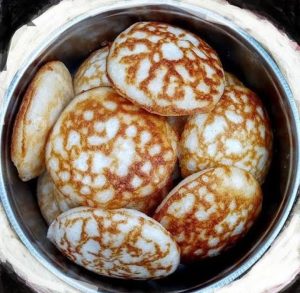

By Dada Ahmed.

(C) Foodnify.
At the crack of dawn in Lokoja, Kogi State capital,the aroma of sizzling masa wafts through the air, drawing both early risers and passersby to the roadside stalls where women tend their clay pots and iron pans. For many such as Mal.Musa Salihu, a labourer at the popular Ganaja junction in lokoja,day hardly begins without this spongy, round delicacy made from rice or maize.
Masa, a staple popular, especially among Hausa communities but embraced widely in Lokoja’s multicultural setting, is more than just food. It is a cultural bridge, a nourishing meal, and for many operators, a thriving business that supports households and sustains livelihoods.
Forty-five-year-old Aisha Musa, who has been selling masa for over two decades at the Old Market in Lokoja, the delicacy is “a gift that keeps giving.” She recalls starting the business of selling masa with just a bowl of rice and firewood but express delight that today, she supplies masa for weddings, naming ceremonies, and political rallies.
“Masa paid my children’s school fees and it still puts food on my table every day,”she says with a smile in a short interview with this writer.
Beyond its economic appeal, nutritionists say masa is a health booster when prepared right. Made largely from fermented rice or maize, masa provides complex carbohydrates that release energy slowly, keeping consumers fuller for longer. This makes it particularly suitable for artisans, traders, and civil servants who need stamina throughout the day.
Health experts add that masa is rich in B vitamins, especially niacin and thiamine,and supports nerve function as well as effective metabolism. According to them,the fermentation process also enhances masa digestibility,thus introducing beneficial probiotics that aid gut health. They pointed out that when paired with soups, stews, or suya, masa becomes a balanced meal providing proteins, fats, and fiber to enhance healthy living.
Nutritionists further explain that for Lokoja residents, mindful of their diet, masa offers a healthier alternative to refined wheat products.
“Unlike white bread, masa is low in additives and can be enriched with beans, millet, or groundnuts for extra protein,” Mrs Caroline Johnson,a food expert explains, recommending masa for both children and adults, noting its role in preventing fatigue and boosting immunity.
Finding shows that in neighborhoods like Ganaja Junction and Kabawa,and tipper’s garage ,along Lokoja-Ganaja road,masa sellers begin their trade before sunrise, often drawing queues of buyers. The affordability also makes it attractive: with as moderate as N500,in such away that one can enjoy a relatively satisfying portion. For low-income earners, this makes masa not just food, but an economic equalizer.
The business side is equally compelling. Many masa sellers employ young girls and boys who assist them with grinding, mixing, and selling, thereby creating jobs. Some operators have grown from roadside vendors to catering entrepreneurs, taking orders from offices, schools, and private homes.
Another masa seller,thirty two-year-old Zainab who manages masa spot around old lokoja market said she started as a helper but that today,she owns her stall, having earned enough to rent an apartment and support his younger siblings. “Masa taught me responsibility. I don’t see myself as just a seller; I’m an employer of labor.”she says with pride, gratitude and air of confidence.
Interestingly, the masa trade in Lokoja also stimulates allied businesses. From rice farmers in neighboring Bassa and Koton Karfe to firewood sellers, pepper grinders, and groundnut oil merchants, the value chain is wide and economically rewarding.
Women dominate the masa industry, turning what was once a domestic chore into a thriving enterprise. Many widows and single mothers acknowledge that selling masa offers them financial independence. They disclosed that some women’s cooperatives in Lokoja even rotate savings from masa proceeds to meet financial family responsibilities and even engage in savings for the rainny day.
Health-wise, masa’s potential goes beyond energy. Studies suggest that diets based on fermented grains may help reduce cholesterol and stabilize blood sugar, this according to them makes masa an option for people at risk of diabetes or hypertension when eaten moderately.
Customers like 62-year-old retired civil servant, Hajia Amina Ahmed,testify to its benefits. “I eat masa with miyan taushe (pumpkin soup) almost every morning. Since then, my digestion has improved and I don’t get tired easily.” For her, masa is more than a meal,it is medicine served hot.
Food experts have expressed optimism that the future of masa in Lokoja looks promising, especially as food tourism is on the rise in Nigeria. They argued that with better packaging, hygiene, and branding, masa could move from street stalls to supermarkets, attracting wider patronage and even exports.
Some young entrepreneurs in neighboring FCT are said to be experimenting with modern ovens and flavored varieties in preparing masa and adding value to the delicacy to appeal to urban tastes.
In a city where traditions meet modernity, masa stands tall as both sustenance and symbol. It fills bellies, strengthens bodies, and fuels dreams. For the operators, it is a ladder out of poverty; for consumers, a taste of culture and health on a plate.
As the sun sets over Lokoja, one constant endures. It must be stressed that, masa business may not attract huge profit like large business enterprises, however,the sizzling of masa on hot pans,its nourishing of the people and boost the micro economy of a growing city of Lokoja makes the business a worthwhile venture.
Ahmed publishes The Reporters.


